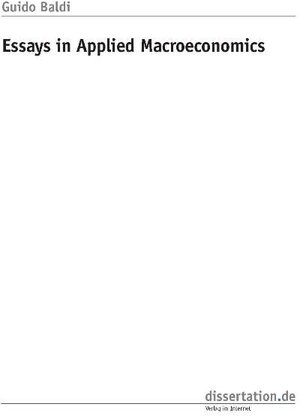
×
![Buchcover ISBN 9783866245563]()
Essays in Applied Macroeconomics
von Guido BaldiThis doctoral thesis analyzes the macroeconomic effects of government policies in three different areas. In the first part of this thesis, our focus lies on fiscal policy and its effects on the most important macroeconomic variables. Monetary policy is then at the heart of our interest in the second part. Finally, the third part of this thesis studies the impact of financial and educational institutions on long-term economic development.
In the first part, we focus on the composition of government spending and its effects on the short-run behavior of macroeconomic variables. The macroeconomic effects of productive government spending are examined within calibrated and estimated DSGE models. While macroeconomic research tends to neglect compositional issues of fiscal policy, our models distinguishes productive from unproductive government spending. In addition, the main model we use incorporates two sectors of production, which allows to study how government demand can stimulate one sector and crowd out the other sector. Our findings suggest that the composition of government spending matters not only for long-run growth, but also impacts on the short-run.
In the second part of the thesis, we shift the focus from fiscal to monetary policy and ask whether a central bank should attach weight to the evolution of house prices. A New Keynesian DSGE model is used with a housing and a banking sector to explore the economic effects of a central bank reacting to house price inflation. We examine the impact of such a behavior for three different shocks, which are associated with three factors that have been stated as possible underlying sources of the recent bubble in the housing market and the following financial crisis. Our findings show that there is a more pronounced increase in house prices and an expansion of the housing sector if the central bank does not react to house prices. If the central bank reacts to house price increases, it has to accept lower economic growth and in some cases even a contraction of the economy.
Finally, we study the effects of structural macroeconomic policies on the economy. More specifically, we study how financial and educational institutions drive the evolution of income and inequality in an overlapping generations model with heterogenous agents. In our model, we find that better educational institutions increase the income of the individuals and are associated with lower income inequality. Better financial institutions also foster economic growth, but are associated with higher income inequality. In addition, we illustrate that focusing on aggregate measures of financial and educational institutions provides misleading results if one neglects changes in the degree of inequality in the access to these institutions.
In the first part, we focus on the composition of government spending and its effects on the short-run behavior of macroeconomic variables. The macroeconomic effects of productive government spending are examined within calibrated and estimated DSGE models. While macroeconomic research tends to neglect compositional issues of fiscal policy, our models distinguishes productive from unproductive government spending. In addition, the main model we use incorporates two sectors of production, which allows to study how government demand can stimulate one sector and crowd out the other sector. Our findings suggest that the composition of government spending matters not only for long-run growth, but also impacts on the short-run.
In the second part of the thesis, we shift the focus from fiscal to monetary policy and ask whether a central bank should attach weight to the evolution of house prices. A New Keynesian DSGE model is used with a housing and a banking sector to explore the economic effects of a central bank reacting to house price inflation. We examine the impact of such a behavior for three different shocks, which are associated with three factors that have been stated as possible underlying sources of the recent bubble in the housing market and the following financial crisis. Our findings show that there is a more pronounced increase in house prices and an expansion of the housing sector if the central bank does not react to house prices. If the central bank reacts to house price increases, it has to accept lower economic growth and in some cases even a contraction of the economy.
Finally, we study the effects of structural macroeconomic policies on the economy. More specifically, we study how financial and educational institutions drive the evolution of income and inequality in an overlapping generations model with heterogenous agents. In our model, we find that better educational institutions increase the income of the individuals and are associated with lower income inequality. Better financial institutions also foster economic growth, but are associated with higher income inequality. In addition, we illustrate that focusing on aggregate measures of financial and educational institutions provides misleading results if one neglects changes in the degree of inequality in the access to these institutions.


